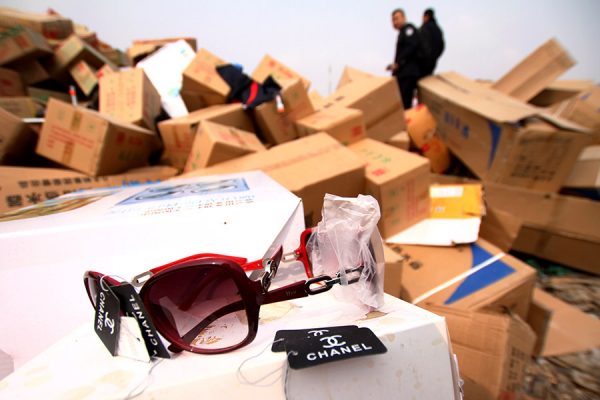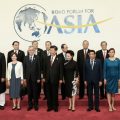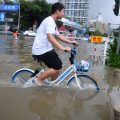
Market regulator targets online discounter Pinduoduo
The appearance of shanzhai products, look-alike counterfeit goods that feature purposely misspelled names of leading brands, on Chinese online discount site Pinduoduo has sparked heated discussion.
Televisions, sold under the brand name Shaasuivg, which could be confused for Samsung, are made by a consumer electronics company in Sichuan province. The sets cost 388 yuan ($57) apiece, more than 10 times cheaper than those produced by the South Korean technology giant.
Other copycat brands with names and products similar to those of Xiaomi, Huawei, Vivo and Oppo have been sold on Pinduoduo, and their prices are listed at just several hundred yuan.
Since its initial public offering in the United States in late July, Pinduoduo has been criticized by the media for selling low-priced knockoffs that resemble products made by well-known manufacturers.
The scathing reports have attracted the attention of China’s market watchdog, the State Administration for Market Regulation. It announced on Aug 3 that Pinduoduo should strengthen platform management and regulate business activities of third-party vendors to maintain fair competition. The announcement came after officials from the regulator met with representatives from Pinduoduo amid reports of rampant counterfeits.
The regulator also announced an investigation into the reports of bogus goods being sold on Pinduoduo. It told the Shanghai Administration for Industry and Commerce, as well as other regulators, to launch targeted investigations.
It also said it would step up efforts to combat the manufacture and sale of counterfeit or substandard goods, including products that try to pass themselves off as well-known brands.
Huang Zheng, Pinduoduo CEO, said his company will “thoroughly rectify and reform” its conduct, cooperate with regulators and not shirk its responsibilities.
Pinduoduo said it is committed to fighting counterfeits, adding that it should do more to tackle the issue of products that copy those produced by leading manufacturers. “Fighting counterfeits is a long-term process. We have learned a lot from the likes of Alibaba, and imposed stricter fines on unlawful merchants,” Huang added.
The company has removed more than 10 million items due to counterfeiting concerns as well as blocking over 40 million links to goods suspected of being pirated.
It is working with more than 400 brands to fight counterfeiters, and has a 150 million yuan fund that enables it to refund consumers who buy fake products.
Founded in 2015, Pinduoduo is the third-largest e-commerce platform in China, behind Alibaba Group and JD, and it has more than 300 million users.
Its focus on user recommendations and social networking to boost sales has set it apart from the traditional search engine model adopted by most e-commerce firms, such as Amazon and Alibaba. When it debuted on the Nasdaq in New York, its shares rose by more than 40 percent on the first trading day.
You Yunting, a lawyer and partner at DeBund Law Offices in Shanghai, said that as an online retailer, Pinduoduo should check the quality and authenticity of the products sold on its platform. It should also be held jointly liable for any infringements due to supervisory negligence, You said.
Chinese e-commerce majors, including Alibaba and JD, have stepped up efforts to crack down on counterfeit products sold by third-party vendors on their online marketplaces.
“We need to fight counterfeits the same way we fight drunk driving”, said Jack Ma, the founder and chairman of Alibaba, in an open letter to the National People’s Congress last year, asking lawmakers to bring in stricter punishments for manufacturers of fake goods.
More than 240,000 stores on Taobao, an online marketplace run by Alibaba, were closed last year on suspicion of intellectual property infringement, compared with 180,000 in 2016, according to Alibaba’s 2017 annual report on intellectual property rights protection.
Ninety-seven percent of listings for counterfeits were deleted before transactions had taken place. The number of listed counterfeit goods removed was 27 times higher than the IP complaints filed by individuals or companies.
Zheng Junfang, Alibaba’s chief platform governance officer, said: “Ninety-five percent of IP complaints were processed within 24 hours. Compared with 2016, the processing time has fallen by 68 percent.”
Artificial intelligence and big data technologies have been used to deal with the counterfeiting problem.
Alibaba is working with the authorities to combat fake products. Last year, it helped the police to arrest 1,606 suspects and raided 1,328 locations where counterfeit goods were being made. The value of the fakes involved in these cases was estimated to be about 4.3 billion yuan.
It also set up an anti-counterfeiting alliance, with the number of members reaching 105, covering 16 countries and regions. The alliance includes well-known brands such as Adidas, Microsoft, Apple and Louis Vuitton.
The alliance said it has destroyed 247 workshops producing and selling fake goods over the past year and helped police to detain more than 300 suspects, adding that the amount of money involved in the cases was 1 billion yuan.
Alibaba said it will further increase investment and cooperate with law enforcement agencies to crack down on counterfeits.
JD has adopted a zero-tolerance attitude toward fake products sold on its online shopping platform, and taken action in a wide range of fields to ensure consumers can buy high-quality and authentic goods.
The e-commerce giant has two business models-direct sales and marketplace. For direct sales, JD said it takes goods directly from suppliers and merchants to ensure that the products are genuine, puts them in its warehouses and then sells them directly to customers.
It said the marketplace model enables well-established, reliable third-party vendors to sell products after a thorough review process. Meanwhile, it has cooperated with third-party testing organizations to carry out regular checks on commodities to ensure their quality.
Industry insiders said the internet has led to consumption patterns being upgraded, and affected and changed consumer behavior, making it easy to expose fake products. Due to the openness of e-commerce platforms, once third-party vendors who manufacture and sell counterfeit products are expelled from one platform, they might continue illegal actions on others.
Wang Huie, a senior analyst at internet consultancy Analysys in Beijing, said: “The problem of fake products has always existed, and most of the fake goods can be found in third-, fourth-and fifth-tier cities and rural areas. The appearance of such goods on e-commerce platforms is due to the lack of a strict and effective review mechanism to exclude fake goods.”
Wang said many consumers living in rural and remote areas cannot afford well-known brands, and tend to buy copycat products that are much cheaper than the authentic goods.
“Pinduoduo should step up efforts to inspect third-party vendors’ qualifications, raise the entry threshold and screen out fake goods by virtue of artificial intelligence, big-data algorithms and consumers’ evaluations,” Wang said.
Li Junhui, an intellectual property researcher at the China University of Political Science and Law, said, “Only through cooperation among multiple parties can we stop the circulation of counterfeit goods from source and prevent them from endangering the market order and harming the legitimate rights and interests of consumers.”
Dong Yizhi, a researcher at China’s E-Commerce Research Center, said combating counterfeiting is a long process, but online platforms should spend considerable amounts of money and use all technological methods necessary to fight IPR infringement and the sale of fake products.


